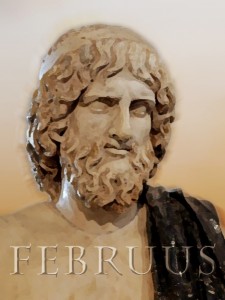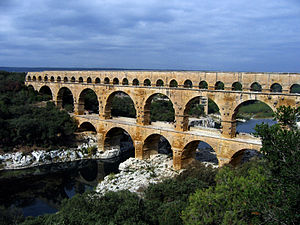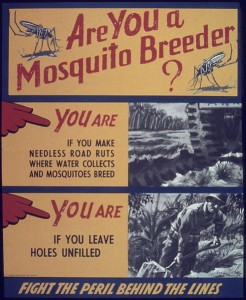How the Mosquito Shaped Ancient Rome Posted by Brittany Britanniae on Jul 31, 2013 in Latin Language, Roman culture
Salvete Omnes,
With July closing, I hope that everyone is having a wonderful summer and is making the most of the warm weather. Summer offers many great experiences from trips to the beach, the Fourth of July, fireworks, trips to the park, family reunions and so on. For the Romans, the god of the seasons including summer was known as Vertumnus (which may be related to the verb vertere “to change”) and he is known as the lord of the season, harvest, and plant accretion.

Vertumnus and Pomona in the Louvre. Courtesy of Marie-Lan Nguyen.
However with the fun-spirited breezes of summer come the bugs. Now in this articles I wish to discuss one of the most determined and dangerous insect of the season: the mosquito. The word mosquito is actually a Spanish word, but the Latin is culex.
Mosquitoes have had a long history with the human race. They have adapted with us in order to ensure their survival and this adaptation has bred many types of diseases, but none deadlier than malaria. Malaria is actually an Italian word meaning “bad air.” However, Italian as a romance language finds it roots within Latin as can be seen with malaria: malus which is an adjective meaning “bad” and aria coming from aer meaning “air.” Sadly, malaria continues today to be a disease that plagues many people, but efforts continue to be made to eradicate it.
Malaria has also been called the Roman Fever. Although the disease was carried by mosquitoes, not all ancient Romans understood the concept of parasites and thus thought the “bad air” brought the disease. They observed that people who lived closer to marshes or swamps were more likely to become ill and die. Due to this, there was even a goddess to prayer and sacrifice to for malaria: Dea Febris. She is believed to be related to, the Roman god of purification, Februus from whom we receive our second month’s name: February.
Since, the Romans were able to discern that “bad air” from the polluted waters of Rome were leading to the illness and death; it prompted change. There was a need for clean water that would promote the health of the people, as Varro said in De Re Rustica Book I, XII.II:
Advertendum etiam, siqua erunt loca palustria, et propter easdem causas, et quod crescunt animalia quaedam minuta, quae non possunt oculi consequi, et per aera intus in corpus per os ac nares perveniunt atque efficiunt difficilis morbos.
For attentiveness must be taken, if in anyway, in swampy places, and for the same reasons, and because there are bred certain small creatures, these things which the eyes cannot follow, and they travel through the air into the body through the mouth and nose and they produce perilous ailments.*
Could this description of “minute creature” be in reference to mosquitoes? Or simply to bad air particles?
Thus avoidance of dirty stagnant water became an essential along with having access to clean drinking water. One can see from this need where the concept of Aqueduct must have originated. The word aqueduct is actually a latin word! Latin aquaeductus, aquae is the genitive of aqua “of water” and ductus means a leading. So literally, an aqueduct is a “leading of water.”
Roman lifestyles changed due to this disease drastically, swamps were drained (even by Julius Caesar), summer home were built in mountains to avoid the marshes, and malaria continued to run rampage in Rome that even four popes died of it hundreds of years later. For an in-depth analysis of how Rome took precautions please read Sura’s Article: The Cloaca Maxima. The Cloaca Maxima was one of the earliest sewer systems which drained swamp water, stagnant water, and other unwanted liquids into the Tiber River.
So, who do you think had it worse when it came to mosquitoes? Some may argue that we can never know the true potency of the mosquito in modern times due to all the medical, commercial, and domestic advances. However, it can not be ignored that this ancient civilization in which most of Western civilization is based upon was greatly impacted by these tiny winged pests. But, was this a positive or negative impact? Some have argued that it was the mosquito that brought the Roman Civilization to its knees and even destroyed it.
The mosquito is a determined little bug who has adapted along side with humans; it has been jestingly called the modern day vampire! So with the summer, come the mosquitoes which bring the agonizing bug bites, itching, bumps, and soreness, this is of course not mentioning the dangers of West Nile Virus.
According to the Huff Post, 2013 has been projected to have a huge boom in the mosquito population due to the hot weather and unusual wet summer. While, West Nile is rare and the death toll from it even rarer; one must be careful to guard against the unwanted blood-suckers! Here is a page on awesome tips to have a mosquito-free summer! So be safe, prepared, and have a wonderful summer!
Valete Omnes,
-Brittany Britanniae
*Questions on the translation please feel free to comment below!

Build vocabulary, practice pronunciation, and more with Transparent Language Online. Available anytime, anywhere, on any device.
About the Author: Brittany Britanniae
Hello There! Please feel free to ask me anything about Latin Grammar, Syntax, or the Ancient World.








Comments:
Joseph T. Madawela:
Thank you. Though I am reading this on Februrary 2 2015, the warm,balmy days of July are no too far away and it is better to be prepared!